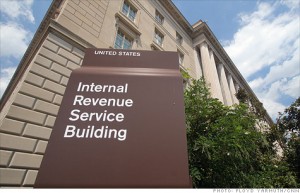
A fellow CPA told me the story of what happened to a small charity.
The small charity thought they were eligible to file the new, easy, short IRS Form 1023-EZ to apply for 501c3 status.
Organizations can use the shorter, cheaper, online Form 1023-EZ if their annual gross revenues are less than $50,000/year and expect to be less than $50,000 for the next 3 years.
So off went the Form 1023-EZ application and the charity was granted 501c3 tax exempt status!
Then they held a fundraiser (or several fundraisers) that were successful beyond their dreams and their total revenue was OVER $50,000 in their second and third year. They filed (correctly) their annual information returns, Form 990-EZ, to report all their income and expenses.
That’s when they got a letter from the IRS.
The IRS was investigating them because the IRS claimed the charity should have filed the longer, more expensive, full Form 1023 when they applied because their annual revenues were more than $50,000/year. (The IRS calls this an examination of compliance check. It’s not quite a full audit, but it probably felt that way to this charity!) And the IRS was right, in hindsight.
The IRS asked for:
- The full application to be completed (its 26 pages!) along with copies of
- Bylaws
- Articles of Incorporation
- Financial statements for 5 years
- A narrative explaining the activities of the organization
- Minutes of meetings
That last requirement surprised me because the Form 1023 application doesn’t ask for minutes of meetings, but the IRS auditor did.
Fortunately this group had those minutes and with the help of their CPA, passed the IRS examination!
Lessons learned:
- Keep minutes of your meetings.
- Have all your documents ready in case the IRS asks to see them.
- If you are close to the $50,000 annual gross revenues threshold and think you could exceed it in your first 3 years, use the full length Form 1023 application form when applying for 501c3 tax exempt status.
Have more questions about the IRS, 501c3 tax exempt status, and your nonprofit?
Carol Topp’s book, The IRS and Your Homeschool Organization can help!

- The benefits of 501(c)(3) status
- The disadvantages too!
- What it takes to make the IRS happy
- What your state requires
- Why your organization should consider becoming a nonprofit corporation
- What is the difference between nonprofit incorporation and tax exemption
- IRS requirements after you are tax exempt
Carol Topp, CPA
